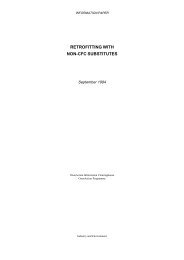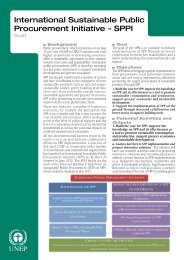industry and environment - DTIE
industry and environment - DTIE
industry and environment - DTIE
Create successful ePaper yourself
Turn your PDF publications into a flip-book with our unique Google optimized e-Paper software.
Chemicals management<br />
Integrated chemical management:<br />
dream or reality in the developing world?<br />
Laurraine H. Lotter, Executive Director, Chemical <strong>and</strong> Allied Industries’ Association, PO Box 91415, Auckl<strong>and</strong> Park, 2006 Republic of South Africa<br />
(caia@iafrica.com)<br />
Summary<br />
South Africa’s chemical <strong>industry</strong> has changed significantly in the last ten years. Representatives<br />
of government, <strong>industry</strong> <strong>and</strong> labour are currently developing a national strategy to improve the<br />
<strong>industry</strong>’s global competitiveness. Chemical management is one of the areas addressed. Ways<br />
to develop more integrated approaches to implementation of international chemicals control<br />
initiatives are described in this article. Implementing the Globally Harmonized System of Classification<br />
(GHS) will be a challenge for both developing <strong>and</strong> developed countries.However, the<br />
GHS is a sound starting point for an integrated approach to chemical management.<br />
Résumé<br />
L’industrie chimique d’Afrique du Sud a considérablement évolué depuis dix ans. Des représentants<br />
du gouvernement, de l’industrie et des travailleurs ont entrepris d’élaborer une stratégie<br />
nationale pour améliorer la compétitivité globale du secteur. Parmi les aspects abordés figure<br />
la gestion des produits chimiques. L’article décrit les pistes possibles pour élaborer des<br />
approches plus intégrées de la mise en œuvre des initiatives internationales de réglementation<br />
des produits chimiques. Mettre en pratique le Système général harmonisé (SGH) pour la classification<br />
des produits chimiques est une gageure pour les pays en développement comme pour<br />
les pays développés. Mais c’est un bon point de départ pour une approche intégrée de la gestion<br />
des produits chimiques.<br />
Resumen<br />
La industria química de Sudáfrica ha cambiado considerablemente en los últimos diez años.<br />
Diversos miembros del gobierno, la industria y el sector laboral se encuentran formul<strong>and</strong>o una<br />
estrategia nacional para mejorar la competitividad mundial de la industria; la gestión de sustancias<br />
químicas es uno de los temas incluidos en dicha estrategia. Este artículo describe diversas<br />
vertientes para el desarrollo de enfoques más integrales orientados a la ejecución de<br />
iniciativas para el control internacional de las sustancias químicas. La aplicación del Sistema<br />
Mundial Armonizado de Clasificación (GHS) representa un desafío tanto para los países en<br />
desarrollo como para los países desarrollados. Sin embargo, el GHS es un punto de partida<br />
firme hacia la gestión integral de sustancias químicas.<br />
The South African chemical <strong>industry</strong> is dominated<br />
by local companies. They developed<br />
from the <strong>industry</strong>’s historical base in the<br />
provision of explosives for the mining <strong>industry</strong>,<br />
followed by the production of nitrogen-based fertilizers<br />
<strong>and</strong> sulphuric acid. The strategic decision<br />
in the 1950s to adopt the Fischer-Tropsch process<br />
to derive oil from coal on a large scale led to the<br />
foundation of a significant polymer <strong>industry</strong>.<br />
Although it is relatively small by international<br />
st<strong>and</strong>ards, South Africa’s chemical <strong>industry</strong> contributes<br />
around 5% national gross domestic product<br />
<strong>and</strong> employs approximately 150,000 people.<br />
Annual production of primary <strong>and</strong> secondary<br />
process chemicals is in the order of 13 million<br />
tonnes, with a value of around 18 billion r<strong>and</strong>.<br />
The <strong>industry</strong> is the largest of its kind in Africa.<br />
Since 1994 the chemical <strong>industry</strong> has undergone<br />
a significant transformation to meet the<br />
challenges posed by the opening up of the economy.<br />
Re-entry into the international community<br />
has entailed a number of challenges in all areas of<br />
<strong>environment</strong>al management, including the sound<br />
management of chemicals.<br />
The government has identified the chemical<br />
<strong>industry</strong> as having potential for growth in a range<br />
of subsectors (e.g. downstream beneficiation of<br />
domestic raw materials). Representatives of government,<br />
the chemical <strong>industry</strong> <strong>and</strong> organized<br />
labour are engaged in developing a national strategy<br />
to improve the <strong>industry</strong>’s global competitiveness.<br />
Such a strategy would not be complete if it<br />
did not include the issue of chemical management.<br />
In view of the competitive imperative to manage<br />
chemicals safely, stakeholders have agreed that<br />
some key elements with respect to this topic<br />
should be included in the agreement on a national<br />
strategy for the country’s chemical <strong>industry</strong>.<br />
International initiatives<br />
At the international level, the chemical <strong>industry</strong><br />
is one of the world’s most highly regulated industries.<br />
Among other factors, the global <strong>industry</strong>’s<br />
competitiveness depends on demonstrating the<br />
ability to implement international initiatives at<br />
the national level.<br />
Recent global developments indicate that there<br />
is increasing dem<strong>and</strong> in multilateral fora for more<br />
integrated approaches to chemicals management.<br />
Delegates to the first Preparatory Meeting for the<br />
Development of a Strategic Approach to International<br />
Chemicals Management (SAICM) in<br />
Bangkok in November 2003 emphasized the need<br />
for more harmonized approaches to chemical<br />
management. 1<br />
International commitments can be broadly<br />
divided into two categories: legally binding obligations<br />
<strong>and</strong> other international initiatives.<br />
Legally binding obligations include:<br />
◆ the Chemical Weapons Convention; 2<br />
◆ the Convention against the Illicit Traffic in Narcotic<br />
Drugs <strong>and</strong> Psychotropic Substances. 3<br />
◆ the Montreal Protocol; 4<br />
◆ the Stockholm Convention on POPs; 5<br />
◆ the Rotterdam Convention on prior informed<br />
consent. 6<br />
Other international initiatives include:<br />
◆ the Bahia Plan of action endorsed at the World<br />
Summit on Sustainable Development (WSSD) in<br />
Johannesburg; 7<br />
◆ ILO Conventions on safe use of chemicals; 8<br />
◆ the Globally Harmonised System of Classification<br />
<strong>and</strong> Labelling of Chemicals (GHS); 9<br />
◆ various capacity building initiatives.<br />
It is clear that a number of potential synergies<br />
exist among these initiatives. For example, classification<br />
<strong>and</strong> labelling is required in order to implement<br />
mechanisms for regulating chemicals. Thus,<br />
the GHS can be seen as an initiative underpinning<br />
many others.<br />
All international initiatives require countries to<br />
prepare <strong>and</strong> present national positions at international<br />
meetings, <strong>and</strong> to submit implementation<br />
reports to the appropriate secretariats. Many initiatives<br />
require control of transboundary movements<br />
of chemicals.<br />
All these initiatives can be contextualized in<br />
some way within national strategies. For example,<br />
phasing out specific pesticides should be seen as<br />
an integral part of good agricultural practice<br />
(which, in turn, is becoming increasingly important<br />
to promote market access).<br />
Responsibility for implementing international<br />
initiatives often rests with national entities, which<br />
have a narrow m<strong>and</strong>ate <strong>and</strong> do not necessarily perceive<br />
international obligations related to chemicals<br />
in the context of the national imperative – for<br />
UNEP Industry <strong>and</strong> Environment April – September 2004 ◆ 19
















